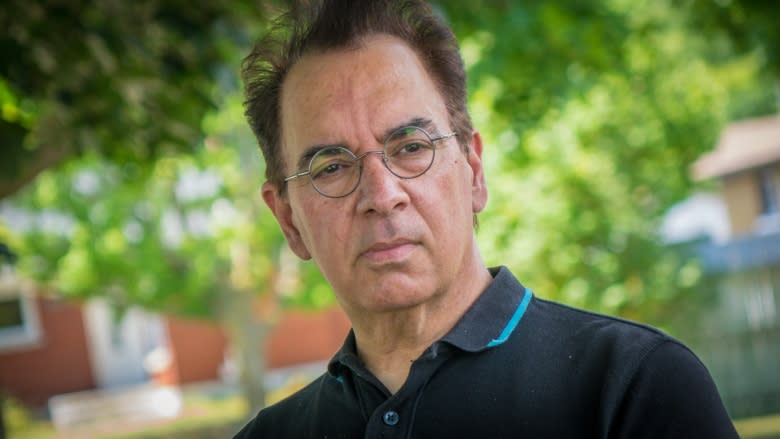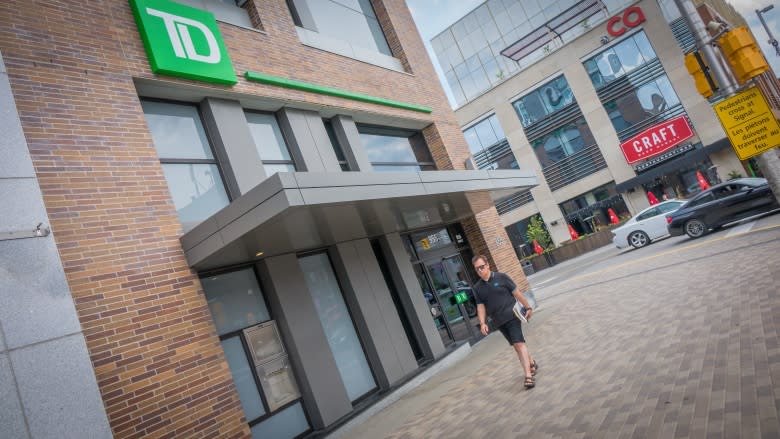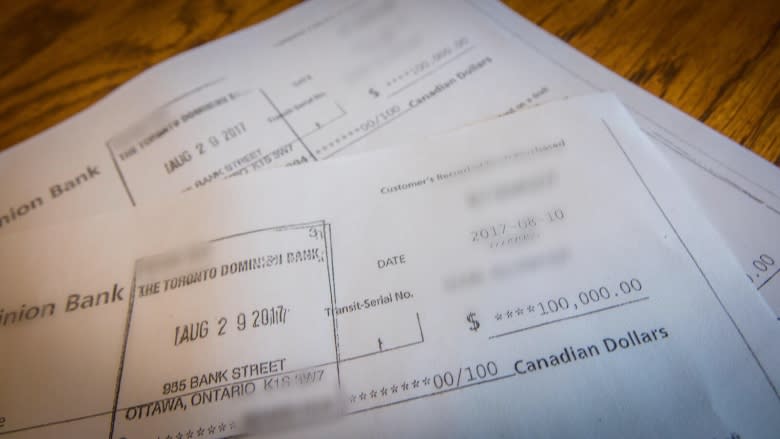Family's $500K inheritance seized by U.S. border officials
An Ottawa man acting as executor of a will says TD Canada Trust gave him "faulty advice" to mail $500,000 in bank drafts to family members in the U.S. — a move that caught the attention of U.S. border officials, who seized the money.
Almost a year later, the money is still stuck at the border. Executor David Saikaley worries the family members may never see their inheritance.
"It's like this money has fallen into a black hole," said Saikaley.
He was in a rush to send the money, because one beneficiary's health is quickly deteriorating, and he needs to pay a mounting pile of medical bills.
Saikaley says TD won't cancel the bank drafts, because it treats the documents as cash. Meanwhile, U.S. border officials won't release the money, deeming it "counterfeit." You can't mail more than $10,000 across the border without notifying officials beforehand. Saikaley says his bank never told him that.
"I had faulty advice," he said. "I trusted the bank. I thought they were experts. I'm just a high school teacher. I don't know anything about sending money.
"There's half a million dollars in limbo and a dying beneficiary. If [he] dies without getting his bequest, I think there's something wrong with that."
Saikaley has complained to TD's ombudsman that the bank that gave him the advice in the first place isn't doing enough to help him out of the mess.
TD Canada Trust declined CBC's request for an interview. In a statement, the bank said it has been working with Saikaley to resolve the issue, including providing letters that the bank drafts are indeed authentic.
"We understand that this is a very frustrating situation and always strive to do our best to resolve any issue that a customer may experience and provide support and guidance," wrote Carly Libman, a senior manager of public affairs at TD.
'They told me bank drafts'
Saikaley thought he was doing a good deed by agreeing to be the executor of a relative's will.
Helen Cuccaro was his mother's cousin. For more than a decade, Saikaley and his wife rented half of her duplex in Old Ottawa South and acted as her caregivers in the final years of her life.
The 92-year-old retired public servant died June 2, 2016.
Cuccaro's will stated she wanted her five remaining family members — mostly nieces and nephews — in Ohio to split her estate.
Saikaley visited Cuccaro's TD Canada Trust branch at Lansdowne Park in August 2017 for advice about how to send the money abroad.
"I asked the associate at the bank what is the best way to send money to the United States when it's an inheritance and it's going to Ohio," he said.
"What is the safest way to send the money? They told me bank drafts. So I took their word and bought the bank drafts right there on the spot — five $100,000 bank drafts."
'I couldn't believe my ears'
Saikaley and his wife drove straight to a FedEx office and paid a premium to express post the money overnight.
But the beneficiaries never got their envelopes with the bank drafts. Instead, a letter from U.S. Customs and Border Protection (CBP) landed on their doorsteps.
CBP wrote that officials had seized the bank drafts at the Port of Indianapolis.
"After careful examination of the shipment, it was determined that the check is counterfeit," reads a notice of seizure letter sent to the beneficiaries.
Saikaley was in disbelief.
"I couldn't believe my ears when they said the cheques were counterfeit," he said. "I was doing what the bank told me to do. It's obvious it can't be counterfeit. It comes from one of the big five banks in Canada. There are TDs in the United States all over the place."
Preferred option
According to CBP's website, people cannot mail more than $10,000 to an address in the U.S. without filing specific paperwork in advance to its Washington office. Failure to do so "may be subject to forfeiture and could result in civil or criminal penalties."
If someone has their bank wire the money to an account in the U.S., it's the bank's responsibility to report this information to Internal Revenue Service. This is the preferred option, according to one will and estate lawyer in Ottawa.
Saikaley says he had no idea. He admits he didn't do his own research and says he trusted the bank's advice instead.
"They should have flagged that for me, and none of this would have happened," he said. "I would have sought out a different method for sending the money."
Ever since, Saikaley and the other five family members in the U.S. have been trying to get the money back over concerns for one of the beneficiary's health.
Beneficiary worries he could die
Michael Hashim is living in Toledo, Ohio, and has diabetes, a kidney transplant and skin cancer.
He used to run his family's pizza joint, but had to sell the long-time business after collapsing two years ago. He's still very weak and can't stand on his feet for long periods of time.
Hashim worries he won't see his inheritance money in time to turn his health around.
"It's very difficult, because you don't know if you're going to be alive long enough," he said. "It's very scary. You get afraid."
The 66-year-old has lost 60 pounds in the past nine months and relies on a daily visit during the week from Meals on Wheels to get by.
He estimates his medical bills have mounted to more than $60,000, mostly because of months he spent in a nursing home unable to take care of himself.
"I actually have so many bills that I just pile them up and stare at them," he said. "I have no food. I have no money to buy anything. I have nobody to help me much."
Petition denied
They family has sent a petition to U.S. border officials saying the bank drafts are legitimate. The package included a letter from TD saying the bank drafts are authentic.
Border officials denied the petition, saying there wasn't enough evidence.
The group has appealed again and was told it could take until November for their case to be heard.
U.S. border officials told CBC News in a statement it contacted TD and has deemed the documents counterfeit. It's awaiting an order to destroy the bank drafts.
Phillip George, the beneficiary in Cleveland, is spearheading the effort to convince U.S. officials the documents are real.
"Very, very frustrated," said George. "The money is legitimate. We're not trying to pull anything over anybody's eyes. We're not trying to sneak anything across the border. I mean our aunt legitimately gave us this money."
He understands there are policies and procedures in place, but says there is no end in sight.
In Ottawa, Saikaley has been trying to get TD Bank to cancel the bank drafts to no avail.
The bank said that it cannot cancel bank drafts, because they "should be treated and protected like cash."
However, if a bank draft is lost there are ways to replace it including asking the purchaser to sign paperwork committing to pay back the money if someone tries to cash the original bank draft. They may also be asked to provide a security deposit.
Saikaley said that isn't an option for him: he doesn't have $500,000 to stand as collateral and expected better customer service from a bank that Cuccaro was loyal to for so many years.
"I don't know if it's the way a big corporation like that should operate," he said. "The woman was a 72-year client. She had over a million dollars in her account. She dealt with them for a long, long time."
"The big concern that I have is it's going to take longer than that beneficiary will live. Morally, I don't think that's correct."




